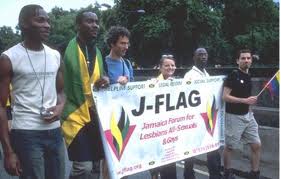
By Christopher Serju–
A decision by the Reverend Father Sean Major-Campbell to openly embrace and show love to members of the lesbian, gay and transgender community during yesterday’s service at the Christ Church in Vineyard Town, Kingston, caught members of the congregation by surprise, with some telling The Gleaner afterwards that they felt betrayed by their spiritual leader.
“I was shocked because it was never mentioned that you going have these things. You hear human rights, and human rights is broad, but I don’t know how suddenly gay rights become human rights and human rights is now gay rights, and I have a problem with that,” said one member who did not wish to be identified.
In what is believed to be an unprecedented act within local church ministry, Major-Campbell washed the feet of two lesbians and subsequently allowed a testimonial from a transgender individual who expressed delight at the acceptance and inclusiveness shown by the church.
Like the women, he is a professional, and has struggled with identity issues, pointing out that this has made life difficult for him and members of his family, including his mother, who he said loves him no less.
Some members of the congregation are now accusing Major-Campbell of betraying them by promoting the theme ‘In Celebration of Human Rights’, in keeping with the liturgical season of convent, but embarking instead on preaching acceptance of the homosexual lifestyle.
They described his action as underhanded.
“I don’t believe you should beat anybody or anything because of their sexual orientation. However, I just think the minister was disingenuous to us, as members, because he told us he was having a human-rights service and at no time did he mention that he would be having these lesbians and whatever, having their feet washed by him. I think the service was more gay rights than human rights … ,” another member said.
In the meantime, concerned but unfazed by the reaction of members of his congregation who took issue with the format and content of the service, Major-Campbell has appealed for greater understanding of human sexuality.
“It is quite understandable that some persons will have some difficulty because human sexuality is a difficult subject and, generally speaking, in our country and culture, we really do not have enough safe spaces for people to explore the subject, without feeling safe or judged, and that is true even of the Church itself,” he told The Gleaner.
 Some church members told The Gleaner they were uncomfortable with how the day’s activities had unfolded.”It was based on the whole sexual orientation and gay rights and I had a problem and many other members had a problem with that. The parson them always run things and can do whatever them want, but out of respect for your congregation, if you gonna do something like that, which is new, you should have had the respect to say it, so people can voice their opinions,” a perturbed member shared.Church not delivering
Some church members told The Gleaner they were uncomfortable with how the day’s activities had unfolded.”It was based on the whole sexual orientation and gay rights and I had a problem and many other members had a problem with that. The parson them always run things and can do whatever them want, but out of respect for your congregation, if you gonna do something like that, which is new, you should have had the respect to say it, so people can voice their opinions,” a perturbed member shared.Church not delivering
However, describing it as a subject that “we need to visit”, the priest said that for too long the Church has gone through the motions, talking about things such as love and kindness but not delivering when faced with the harsh realities of those demands.
He explained: “The truth is the call to love is not just about your close friends and close family and those it is easy to love; the call transcends those we are not so comfortable with, as well.”
In his sermon, Major-Campbell, a regular letter writer to The Gleaner on rights and sexuality, and who has been critical of churches, urged congregants to move beyond praying and talking about justice to becoming active agents in the promotion of human rights.
This was welcomed by the transgender man, identified as FJ, who testified that this was his first visit to a church in a very long time “because it wasn’t a very safe place for me anymore”.
He admitted to feeling very touched by the reception at the church.
Meanwhile, Rochelle (surname withheld), one of the lesbians who attended the service, told The Gleaner she had some concerns about personal safety now that she has gone public.
The love and support of family and friends would continue, she said, but the fear of being targeted by others was very real.
International Human Rights Day is observed on December 10 each year and seeks to bring to the attention ‘of the peoples of the world’ the Universal Declaration of Human Rights as the common standard of achievement for all peoples and all nations.
This year’s slogan, Human Rights 365, encompasses the idea that every day is Human Rights Day, and celebrates the fundamental proposition in the Universal Declaration that each person, everywhere, at all times is entitled to the full range of human rights; that human rights belong equally to all individuals; and bind persons together as a global community with the same ideals and values.
christopher.serju@gleanerjm.com

You must log in to post a comment.